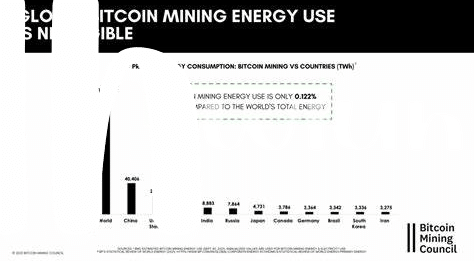Explaining Bitcoin Mining Process ⛏️

The process of Bitcoin mining involves powerful computers solving complex mathematical puzzles to validate transactions on the blockchain. Miners compete to be the first to solve the puzzle and add a new block to the chain, earning rewards in the form of new Bitcoins. This process requires significant computational power and energy consumption, making it essential for miners to have access to reliable electricity sources. As the network grows and more miners join, the competition intensifies, driving up the energy consumption associated with mining.
In addition to the energy required for the mining process itself, the cooling systems needed to prevent overheating further contribute to the overall energy consumption. This intricate process underscores the inherent link between Bitcoin mining and energy usage, presenting challenges and opportunities for sustainable energy practices in the future.
Energy Consumption Impact in Cambodia 🌏
Bitcoin mining has brought about a surge in energy consumption in Cambodia, significantly impacting the country’s energy grid. The demand for electricity has skyrocketed due to the energy-intensive process of mining cryptocurrencies, leading to strain on the existing infrastructure. This rapid increase in energy consumption has prompted concerns about sustainability and the potential risk of power shortages in Cambodia. As the demand for energy continues to rise with the growing popularity of Bitcoin mining, finding a balance between meeting energy needs and preserving natural resources has become a pressing issue for the country to address. Efforts to explore green energy solutions, like those discussed in related articles, are crucial for ensuring the long-term viability of Cambodia’s energy grid amidst the challenges posed by Bitcoin mining operations.
Challenges Faced by Cambodia’s Energy Grid ⚡

Cambodia’s energy grid faces significant challenges when it comes to sustaining the increasing demands triggered by Bitcoin mining activities. The strain on resources and infrastructure is a pressing concern for the country, leading to power shortages and disruptions in electricity supply. Moreover, the fluctuations in energy consumption due to mining operations introduce complexities in managing the grid effectively, impacting both reliability and cost-effectiveness of the system. These challenges underscore the urgent need for strategic planning and investment in enhancing the capacity and resilience of Cambodia’s energy grid to mitigate the adverse effects of Bitcoin mining on the overall energy ecosystem.
Potential Solutions and Innovations 💡

Bitcoin mining companies in Cambodia are exploring sustainable solutions to reduce their environmental impact. Some are investing in renewable energy sources like solar and wind power to lower their carbon footprint. Additionally, implementing energy-efficient mining hardware and cooling systems can help optimize energy consumption. By collaborating with local communities and government authorities, these companies aim to develop environmentally friendly practices while still operating profitably. For further insights on sustainable practices in the Bitcoin mining industry, check out this article on bitcoin mining energy regulations in Burkina Faso: here.
Environmental and Social Consequences 🌿
Bitcoin mining in Cambodia has brought both environmental and social consequences. The surge in energy demand has led to increased greenhouse gas emissions and strain on the energy grid. This has raised concerns about the sustainability of the mining operations and their long-term impact on the environment. Additionally, the rapid growth of mining activities has sparked debates about the social implications, such as land use conflicts and potential displacement of communities residing near mining facilities.
The environmental and social consequences of Bitcoin mining in Cambodia underscore the need for a balanced approach that considers the welfare of both the ecosystem and the local communities. Finding ways to mitigate the negative effects through sustainable energy sources and community engagement initiatives is crucial for ensuring a more harmonious coexistence between mining operations and the environment. Balancing economic opportunities with environmental and social responsibility will be key in shaping the future of mining practices in Cambodia.
Future Outlook for Sustainable Mining Practices 🔮

In the dynamic landscape of Bitcoin mining, the future outlook for sustainable mining practices shines with promise. As technologies advance and awareness grows, the industry is poised for a shift towards environmentally conscious strategies. This evolution encompasses efficient energy usage, renewable sources, and community engagement, paving the way for a more sustainable approach to mining operations. With a focus on innovation and collaboration, the future holds exciting prospects for balancing the energy-intensive nature of mining with the imperative of environmental responsibility. Embracing this trajectory will not only bolster the resilience of the sector but also contribute to a harmonious coexistence with the surrounding ecosystem and communities. Through proactive initiatives and strategic planning, the path forward for sustainable mining practices is illuminated with optimism and potential.
For more information on global Bitcoin mining energy regulations, check out the detailed guidelines in Brunei on bitcoin mining energy regulations in Brazil.
